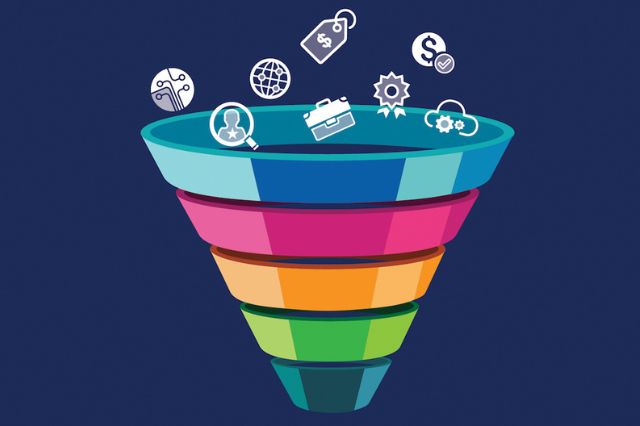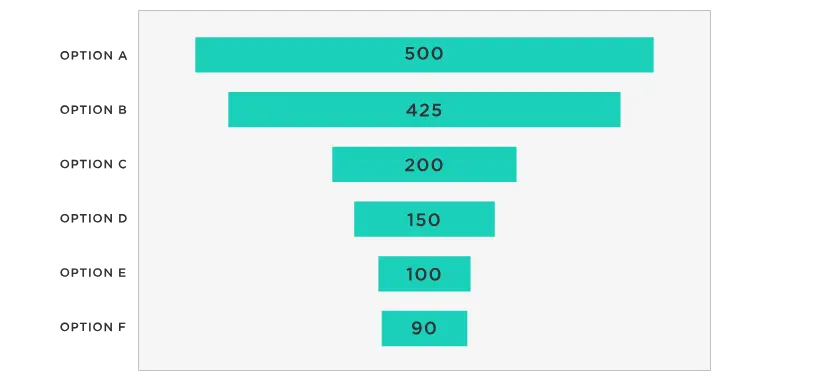Business
Utilizing Funnel Chart Data to Identify Areas of Improvement in Your Sales Strategy

When it comes to formulating a strategic approach to business sales, understanding and utilizing data effectively is key. In this digital era, several tools can assist organizations in shedding light on sales performance and identifying opportunities for growth.
Among these, the funnel chart plays a significant role. In this article, we’ll explore how funnel chart data can be used to pinpoint areas of improvement in your sales strategy.
Understanding the Importance of Funnel Chart Data


While many data visualization tools provide a broad overview of business performance, a funnel chart presents unique insights into the sales process. It illustrates the progression of potential customers through different stages, from lead generation to conversion. This allows businesses to identify where prospects are dropping off in the sales process.
The importance of funnel charts extends beyond offering a snapshot of sales conversion rates. They represent granular information on how potential customers are moving through each phase of the buying journey. As a result, they can be key instruments in evaluating sales strategies and spotting areas for improvement.
Given the visual nature of a funnel chart, data interpretation becomes simpler. It fosters comprehensive analysis of the sales pipeline and helps businesses take targeted actions based on evidence from the chart.
The Connection Between Funnel Chart Data and Sales Performance


Funnel chart data has a direct correlation with sales performance. It provides a visual representation of the efficiency of the sales process, indicating where the conversion rates are low or high. This aids organizations in identifying the stages that require attention and improvement.
For instance, if a significant number of potential customers are dropping off at the product demo stage, it may suggest the need to improve the demo experience or clarify product features. This understanding, derived from the funnel chart, can help businesses enhance their sales performance.
Furthermore, looking at the progression patterns over time can help identify trends and predict future sales performance. The funnel chart data provides insights that can be instrumental in making strategic data-driven decisions.
Using Funnel Chart Data to Uncover Weak Spots in Your Sales Process
The funnel chart is among the most effective tools for identifying weak spots in your sales process. It allows organizations to see clearly where prospects are leaving the sales cycle. By comparing conversion rates at each stage, businesses can identify the stages that are performing under expectations.
These weak spots could be due to several reasons. For example, it could be that the marketing messaging is not compelling enough to take clients to the next stage, or the customer service team is not prompt enough in addressing client queries. Regardless of the underlying cause, funnel chart data help uncover these issues.
Once identified, these weak spots can be examined in more detail to understand the root cause. Contextual information, user feedback, and additional data can be used to build a clearer picture of why prospects are dropping off at specific points in the funnel.
Implementing Changes Based on Funnel Chart Data Analysis
Identifying areas of improvement is just the first step. Implementing changes based on the insights gained from the funnel chart data analysis is key to boosting sales performance. The changes could involve enhancing marketing strategies, improving customer engagement, or revamping product features.
Once adjustments to the sales process have been made, they need to be communicated to the entire sales and marketing team. This ensures everyone is well aware of the changes and can adapt their strategies and efforts accordingly.
It’s also important to note that changes should not be made in isolation but rather integrated into the broader sales strategy. A holistic view of the sales process ensures that improvement efforts are coordinated and do not result in unintended consequences elsewhere in the funnel.
The funnel chart has proven to be integral to businesses and organizations operating in the modern data-driven corporate world. The funnel chart data offers invaluable insights into the sales process and empowers businesses to make informed decisions for improvement. By identifying weak spots and implementing changes based on the data analysis, companies can optimize their sales performance and drive growth.
Finance
Home Equity Loans: Leveraging Your Home’s Value


For homeowners looking to tap into their property’s value, home equity loans present a powerful financial tool. Whether you need funds for home improvements, debt consolidation, or unexpected expenses, a home equity loan can provide the necessary capital.
This guide explores the fundamentals of home equity loans, their benefits, and essential considerations for borrowers.
Understanding Home Equity Loans
A home equity loan allows you to borrow against the equity you’ve accumulated in your home. Equity is the difference between your home’s current market value and the outstanding balance of your mortgage. Home equity loans provide a lump sum payment that is repaid over a fixed term, typically at a fixed interest rate. This stability contrasts with home equity lines of credit (HELOCs), which function more like revolving credit with variable rates.
Benefits of Home Equity Loans
Home equity loans offer several advantages that make them an attractive option for homeowners:
- Fixed Interest Rates: With a fixed interest rate, your monthly payments remain constant, making it easier to budget and plan your finances.
- Potential Tax Benefits: The interest paid on a home equity loan may be tax-deductible, depending on how the loan is used. Consult a tax advisor to understand your eligibility for these deductions.
- Access to Larger Funds: Since the loan is secured by your home, you may qualify for a larger loan amount compared to unsecured loans, allowing for more extensive projects or purchases.
- Debt Consolidation: Home equity loans can be used to consolidate high-interest debts, such as credit card balances, into a single loan with a potentially lower interest rate.
Key Considerations Before Taking a Home Equity Loan
Before applying for a home equity loan, consider the following factors to ensure it aligns with your financial goals:
- Loan-to-Value Ratio (LTV): Most lenders require an LTV ratio of 80% or lower, meaning you need significant equity in your home to qualify for a loan.
- Credit Score: A strong credit score can help you secure better interest rates and loan terms. Review your credit report and address any issues before applying.
- Repayment Ability: Consider your ability to make consistent payments, as failing to repay the loan could result in foreclosure.
- Closing Costs and Fees: Be aware of any closing costs, origination fees, or other charges associated with the loan, as these can add to the total cost.
Quick Tip:
Use an online home equity loan calculator to estimate your potential loan amount and monthly payments, helping you plan and budget effectively.
Exploring Home Equity Loan Options
Home equity loans are offered by a variety of lenders, including banks, credit unions, and online financial institutions. Here are some options to consider:
Banks and Credit Unions
Traditional banks and credit unions often provide competitive home equity loan rates and terms. These institutions offer personalized service and can help you navigate the borrowing process.
Online Lenders
Online lenders offer the convenience of applying for a loan from home. Many online platforms provide quick approvals and competitive rates, appealing to tech-savvy borrowers seeking flexibility.
Conclusion
Home equity loans offer a valuable opportunity for homeowners to access funds for various financial needs. By understanding the benefits, key considerations, and available options, you can confidently navigate the borrowing process and secure a loan that aligns with your financial goals.
Remember to research thoroughly, compare offers, and choose a reputable lender to ensure a positive borrowing experience.
Whether you’re planning to renovate your home, consolidate debt, or finance a major purchase, a home equity loan can provide the financial support you need. Explore your options and make an informed decision that suits your unique needs.
Finance
4 Reasons You Should Care about Your Credit Score


If applying for a small business loan, your credit score can make or break your chances of securing one and getting a good interest rate.
Whether starting a business, looking to expand, or requiring funds for other purposes, you may one day need a business loan. Getting the best terms possible is a priority. That’s one reason to consider your creditor score and how it’ll factor into your search for a business loan.
Here are four reasons your credit score matters. You’ll also see how to get help with credit score disputes if you can’t resolve such conflicts independently.
1. Credit Score Determines If You Get a Business Loan
If getting a business loan is a make-or-break issue for your company, you should be mindful of your credit score. Remember that lenders aren’t in the business of offering loans to people who present a substantial risk.
So, if your credit score is less than optimal, lenders could balk at lending you a loan or offer less money to reduce their risk. It’s a good idea to consider your credit score to see if you can realistically qualify for a business loan with reasonable terms.
Otherwise, you may have to explore other options to secure money for business needs. There are alternative ways to get funds. But it might mean accepting a higher interest rate or onerous terms.
2. Credit Score Affects Your Interest Rate
Even if you qualify for a business loan, you may not get a good interest rate if your credit score isn’t good. Even a few percentage points more could translate into paying back thousands more to complete your payback obligations.
You’ll have to consider whether you can afford to shoulder a high premium in interest payments to get a business loan you might not qualify for otherwise.
If forced to pay higher interest for a business loan, the lender may have other stringent terms. You should carefully consider the particulars before signing on the dotted line.
3. Credit Score Can Impact How Much You Qualify for
As was mentioned above, your credit score can influence how much a lender is willing to lend. If your credit is not good enough to grant you the amount you want, a lender may offer a business loan for a fraction of that sum.
That can happen when a lender doesn’t feel comfortable enough lending you more than a specific amount. It’s about limiting the potential fallout if you’re unable to pay your loan.
When a lender looks at your finances, it’ll know how much you can afford to pay back. If it determines you’ll struggle to pay back the amount you request, it might simply offer a lower amount more in line with your cash flow.
4. Credit Score Can Throw a Wrench in Your Business Plans
You may struggle to grow your business if you desperately need a business loan but have poor credit. In fact, you may face financial problems that threaten the long-term viability of your company. So, your credit score can make or break your business. Don’t allow bad credit to throw a wrench into your plans. If possible, improve your credit score before applying for a loan.
While a bad credit score can cause problems for your business, there are times when your credit report may include inaccurate information. Whether the credit report hasn’t been updated or includes completely false information, you may struggle to get the information corrected.
If you can’t make progress on this front, you may need to speak to a lawyer. A legal professional experienced in helping clients involved in credit score disputes can be a godsend.
Business
How Has E-commerce Evolved?


E-commerce has a relatively short history in business. The earliest incarnations of e-commerce stretch back to the 1970s, when early technologies such as teleshopping and Electronic Data Interchange helped to create a primitive version of this form of commerce.
However, modern e-commerce started to take off in 1994 when the entrepreneur Jeff Bezos set up Amazon from his garage. Initially, Amazon was an online marketplace just for books. In the years that followed, the range of products available increased.
Today, millions of unique products can be bought on the site, which has led it to become known as “the everything store.” Today, there are estimated to be over 26 million e-commerce websites worldwide, with around 13 million based in the US.
The e-commerce sector has grown rapidly and is predicted to continue to enjoy year-on-year growth for the foreseeable future.
However, in its relatively short history, there have been several developments that have shaped how companies operate online. In addition, consumer behavior and shopping preferences have changed as people regularly buy products and services online.
In this article, there will be a discussion of how e-commerce has evolved. Some key examples will be used to support this.
Social media promotion is integral to the sector
In the early days of e-commerce, there was far less competition between businesses because there were far fewer e-commerce firms. The internet has grown at an exponential rate since the early 1990s, and consumers can now find virtually any product, service, or specialist e-commerce firm online.
Due to the massive growth in the e-commerce sector, online firms now need to have a comprehensive marketing plan to promote their site and their products. This is vital to allow companies to stand out in an increasingly crowded online marketplace.
A key marketing strategy for millions of e-commerce firms is leveraging social media promotion’s power. Popular social media sites such as TikTok have around 1 billion monthly users, which makes the site a prime avenue for online promotions.
There is a global community of visitors to the site, which encompasses a wide range of demographics and target markets. Today, most e-commerce sites will have a marketing budget specifically for social media promotions.
They will create short but memorable adverts (typically using video) and will ensure that a hyperlink is embedded in the advert that takes the viewer to the product page of their website.
This simple strategy transforms customer interest into a sale with the lowest number of steps required on the part of the consumer. In short, social media promotion is a vital activity for any e-commerce firm and helps them to stand out in an increasingly crowded online marketplace.
The changing attitudes to delivery
In the early years of e-commerce, consumers understood that delivery timescales may be relatively long. Many customers were starting to buy from international sellers or fledgling e-commerce firms in their own country. During the early stages of e-commerce, there were few advanced delivery networks for online firms.
During the 1990s typical delivery timescales were far longer than today. Most products would take at least five days to arrive and potentially could be in transit for weeks.
Whilst consumers tolerated these timescales in the early days of e-commerce, they now expect quicker delivery schedules. In addition, if the stated delivery period is not adhered to and there are delays, many customers will stop using the e-commerce site.
As consumer delivery expectations increase, e-commerce firms must ensure that they can work with dependable and efficient shipping and courier firms. Companies such as Shiply USA may be ideal for smaller e-commerce firms that do not have their own delivery networks.
Such firms can offer highly competitive prices for shipping a range of goods. In addition, they have built a reputation for delivering to pre-stated timescales, with minimal levels of damage to items in transit.
In short, all e-commerce firms need to forge strong working relationships with professional shipping firms who can deliver on time and with competitive fees.
The rise of chatbots in online customer service
Finally, modern online shoppers expect that any queries or questions that they may have will be answered swiftly with excellent customer service. Not receiving a timely response to their correspondence creates a negative perception of the company and may make them less likely to purchase from the site.
E-commerce firms have been quick to recognize the value of swift responses to customer queries and are increasingly using AI to facilitate this. Chatbots are now widely used in e-commerce. They are programmed to understand language and detect the key question raised, directing customers to specific web pages with information on the topic.
This can help customers get the information they need and reduce the reliance on a large human customer service team, keeping such staffing costs low.
-



 Captions3 years ago
Captions3 years ago341 Sexy Captions to Fire Up Your Instagram Pictures
-



 Captions3 years ago
Captions3 years ago311 Night Out Captions for Instagram and Your Crazy Night
-



 Captions3 years ago
Captions3 years ago245 Saree Captions for Instagram to Boost Your Selfies in Saree
-



 Captions3 years ago
Captions3 years ago256 Best Ethnic Wear Captions for Instagram on Traditional Dress
-



 Captions3 years ago
Captions3 years ago230 Blurred Picture Captions for Instagram
-



 Captions3 years ago
Captions3 years ago275 Deep Captions for Instagram to Express Your Thoughts
-



 Quotes3 years ago
Quotes3 years ago222 Nail Captions for Instagram to Showcase Your Fresh Manicure
-



 Captions3 years ago
Captions3 years ago211 Laughing Captions for Instagram | Laughter Is the Best Medicine







